Progression of knowledge and skills
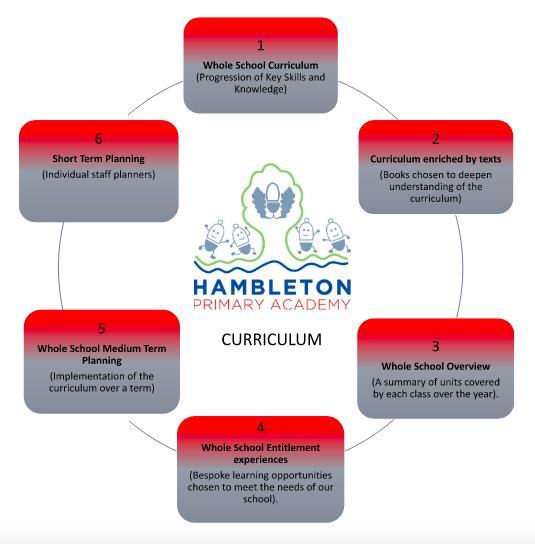
Subject Implementation
Hambleton Primary Academy seeks to provide an all-round education for children in a bright, stimulating and fun atmosphere. At Hambleton, we spend each half term understanding our classes and developing an overview of what we feel the class need at that time. We do this through regular monitoring of behaviour and through regular discussions with the class- often coming from the thought boxes located in every classroom. RSE is taught mainly through PSHE lessons when covering the ‘relationships’ and ‘changing me’ units of work. In addition to this, RSE is also taught within Science Biology lessons (with the exception of Year 3 and 4 who do not cover the human body) and through computing lessons where esafety is the focus. Lessons are evidenced in a floor book which the children can access as part of their reading area. We always focus on the ‘now’ teaching the children
RSE lessons which are tailored to the children’s needs at that time. Teachers ensure that these lessons are age appropriate using the guidance and terminology from the scheme of work. Teaching RSE prepares children to develop friendships and have an understanding of what a healthy relationship should look and feel like. It also prepares children well for understanding how the body changes as they move through school.
Fundamental Great British Values
At Hambleton, we understand our responsibility in preparing children for their next stage of education and for the opportunities, responsibilities and experiences of later life, laying the foundations so that they can take their place successfully in modern British society. We understand how this subject has an underpinning link to British values. The spiritual, moral, social and cultural development of each child is central to everything that we do as a school. Our RSE work reflects our inclusive environment and through the many opportunities provided for our children, they develop understanding of mutual respect. Units of work include relationships, changing me, the human body in Science and Esafety in computing. During these lessons we discretely underpin the British values and evidence this work taking place in our floor books. By creating a safe space to share thoughts and opinions children are constantly given the opportunity to demonstrate mutual respect.
Planning
Our curriculum is thoughtfully planned to engage and inspire all our learners. Our whole school curriculum (a progression of knowledge and skills) and long term plans, map out the RSE topics covered for each class. Teachers choose to teach the RSE topics when they feel their class are ready. This could be through discussions or class maturity. One off RSE lessons are actively encouraged to ensure previous learning is revisited in different scenarios which may have taken place around school. Additionally, planning and teaching in RSE is fully inclusive ensuring that all children can access the curriculum at their level. Knowledge and skills taken from the scheme of work are progressively built upon as children journey through our school and all lessons are taught in an age appropriate way. Parents are sent a letter in advance of the teaching of RSE to prepare families for further conversations which may happen at home. Parents are also allowed to remove their child from RSE specific lessons (through PSHE) and can choose for their child to have basic RSE taught to them through the Science and Computing topics mentioned above. Enrichment activities are carefully planned to ensure that children have experiences beyond the classroom that help to influence, alter stereotypes and judgements and develop understanding of how the human body works.
Based on the changes made to the Early Years Foundation Stage Framework in 2021, PSED continues to be one of the prime areas of learning. Within PSED children learn how to be a good friend and how to make positive relationships with others.Children are shown how to care and play well with others, share and take turns as well as demonstrate determination and resilience in completing challenges. It is recognised that without these things the children will not be able to achieve in other areas of the curriculum. Children learn about the world around them and the people in this world. They also learn about Esafety through any computing lessons which take place. RSE is discretely taught through these. As well as weekly PSHE lessons (where RSE
is taught), Reception are encouraged to develop PSED (RSE) through their play based activities. This is done in a carefully planned continuous provision set up.
Children are encouraged to develop the following through different continuous provision activities;
· Making Relationships
-Keeping themselves and others safe
Collecting Evidence
Evidence is collected throughout the year and in a variety of different ways. These include, planning in Staff Planners, subject monitoring (floor book scrutinies, walk throughs and pupil voice), staff discussions (meeting notes) and data captures. Classes have a PSHE floor book where all RSE lesson discussions and activities are displayed and shared. Often discussions linked to RSE which happen outside of lesson take place throughout the day. These are also evidenced in the class floor book and are labelled with a yellow sticker. This reminds children of previous discussions that we have had. All classes have a ‘thought box’ where children can write down their worries, celebrations or moments of reflection which are then shared with the class. These can also be found in the PSHE floor books for children to reflect on together.. Examples of work from lessons are included on learning journeys displayed in classrooms. In addition to this, Hambleton’s Facebook Page is used to collect and record examples of RSE cultural capital. We also have a school enrichment floor book which ensures that these discussions can be shared with other classes, parents, governors and visitors to our school.
Able, Gifted and Talented Pupils
Key skills and knowledge needed for each year group are used to assess pupils and are assessed against and added to our subject data collections. However, as our RSE shows so much variation in what and how it is taught, depending on the unit of work depends on who those able children are. Teachers often highlight these children during the lesson and will tailor their questioning, chosen working groups and activities based on the discussions which are taking place at the time. The subject leader supports teachers in supporting greater depth pupils and ensuring breadth and balance. The subject leader will work with staff to ensure the development of techniques and opportunities which deliver appropriate stretch for AGT pupils within lessons.
SEND and PP Pupils
At our school we teach PSHE to all children, whatever their ability. It is part of the school curriculum policy to provide a broad and balanced education to all children. We provide learning opportunities that are matched to the needs of children with learning difficulties. Work in PSHE takes into account the targets set for individual children in their Personal Plans (PPs).
During PSHE discussions, questions are tailored to match the needs of target children. TA’s are trained to work specifically with these target children to give them opportunities to take part in group and independent work as well as respond to discussions during carpet time.
Enrichment opportunities
The PSHE curriculum is widely enriched through visual and high-quality practical resources, after school clubs, trips and visits including:
Enrichment Activity Examples Further Information
Every class has the opportunity to take part in a sports competition across the Wyre and Fylde area.
Relationships- Promoting team work and demonstrates how friendships and relationships can develop in new situations
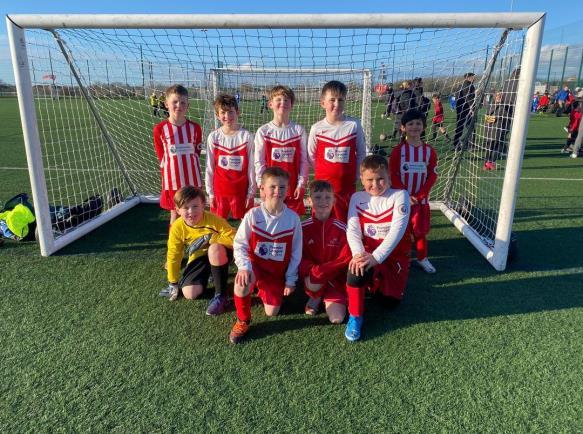
Every class has the opportunity to perform as a class and in groups on stage.
Relationships- Promoting team work and demonstrates how friendships and relationships can develop in new situations.
Forest School Extra Curricular
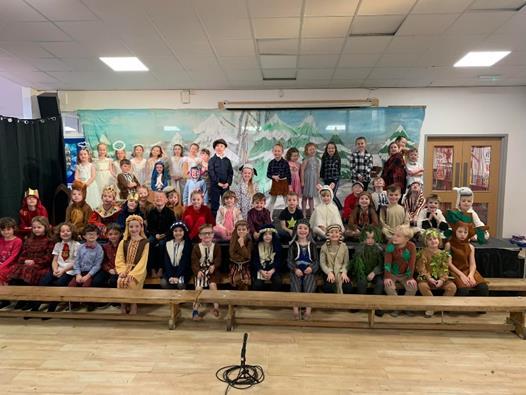
Relationships
- Children work in pairs and groups with mixed classes to build dens and other structures in our forest school extra curricular club. Children are learning how to negotiate and work with people they wouldn’t normally work with.
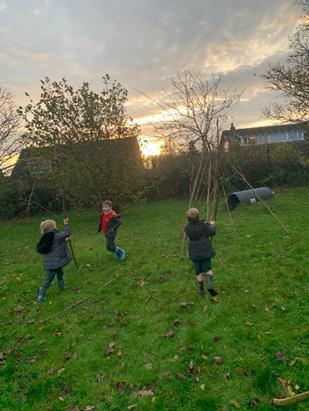 Doctor Visit
Changing Me- Nursery had a visit from a local doctor. They learnt how their bodies change as they grow up ready to start school.
Doctor Visit
Changing Me- Nursery had a visit from a local doctor. They learnt how their bodies change as they grow up ready to start school.
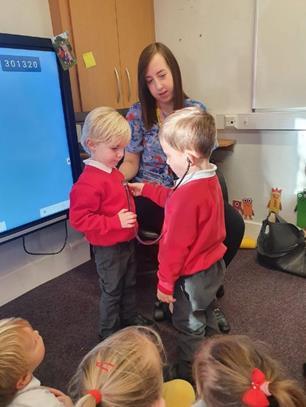
Dance Festival
Relationships Children continue to learn how to work in groups to perform a dance in front of an audience. Confidence, resilience and self esteem are all developed in the lead up to this.
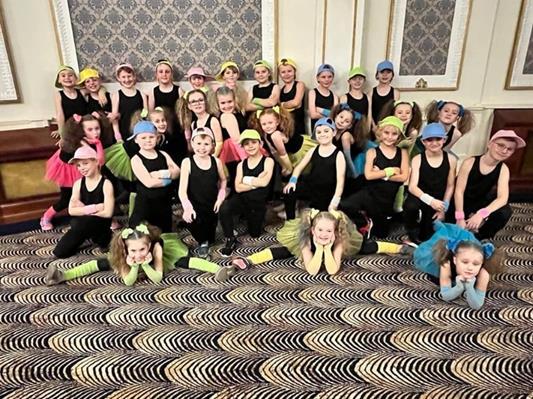
and Canoeing
Relationships-Year 5 learnt how to canoe and kayak in a group. This tested the children's friendships and class relationships and strategies had to be put in place to ensure voices were heard and the kayaks moved successfully.
Kayaking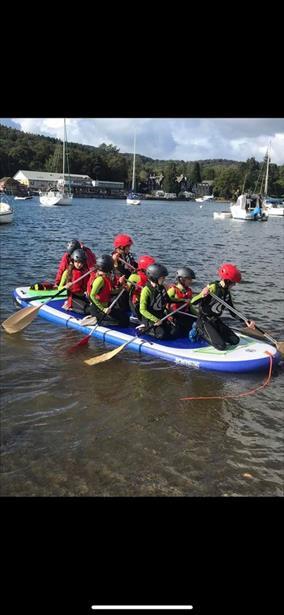
Targets
To adapt lessons to meet the needs of the class through one off lessons
This will ensure that PSHE lessons are tailored and respond to children’s needs. This will allow for children to use PSHE lessons to ask complex questions and use knowledge from sessions in their everyday life.
To tweak the initial and end assessments to ensure that all children are being assessed each unit and that there is clear evidence of this.
This will ensure that a beginning and end assessment for each child is evidenced. Progress will be clear to the class teacher and subject lead. Assessment of children’s progress is therefore more accurate. Gaps in the class can then be highlighted and children can be supported in their learning accordingly.
To create a PSHE curriculum map for each class that meets the needs of children
Ensure that each class's needs are being considered throughout the year. Units of work can then be tailored to meet the growing needs of the class and will allow time to spend on topics that need more time. The Jigsaw scheme of work will be used as a tool to support planning and ensure that content is covered.
Impact of Staff Training
Subject Leader provided training for all staff.
PSHE QIG
• An understanding of what initial and end assessments should look like in PSHE
• Ensuring consistency takes place in all PSHE floor books
• Highlighted other subjects which RSE can be taught through, It doesn’t have to be just PSHE.
• Introduction of ‘one off PSHE and RSE lessons’ to highlight and address issues with individual classes.
• Introduction of ‘thought boxes’ to allow children to share achievements and worries in a safe space post COVID.
• Assessment opportunities and ideas shared on powerpoint slides which have been brought back to Hambleton for teachers to use as their own assessments.
• Opportunities to reflect and share PSHE and RSE teaching in own school and comparing that to others.
• Google drive has been set up with a PSHE and RSE folder to share best practise from other schools. Our school has been asked to share PSHE floorbooks as the QIG groups feel that this is something that we are doing well at Hambleton.
Assessment / Measuring Impact
Ongoing assessment and review is fundamental to everyday teaching at Hambleton Academy. Teachers are constantly making judgements with regards to attainment in lessons to inform planning and to ensure on the spot differentiation. Children are given access to the class PSHE book and can access this as they please. This allows children to reflect on previous discussions and use the books as a guide to any issues that may arise in school. As such, verbal feedback within the lesson is crucial in ensuring key conversations and terminology are taught and assessed for individual children. Teachers then record any formative assessment within their planners. An initial assessment takes place at the beginning of a new RSE unit of work and this is then repeated at the end. This will demonstrate the impact that unit of work has had in RSE and what progress has been made. Attainment is then reported termly via data captures stating whether children are working towards the expected standard, working at age related expectations or working at greater depth. From this data, we can adapt teaching focuses to ensure key skills are being addressed and promoted adequately. Parents are informed of their child’s attainment and effort on a termly basis through Parents’ Evenings and end of Year Reports.
Future Targets
• To ensure that floor books remain consistent and follow the same assessment approach.
• Continue to develop work on the Thought boxes. Ensure that these are actively used in classes to allow all children to have a voice and to celebrate achievements.
• Ensure that all one off PSHE and RSE sessions are included within our floor books and children are given time to reflect on these by independently accessing the floor books.
• Ensure RSE is being taught across other subjects not just PSHE
